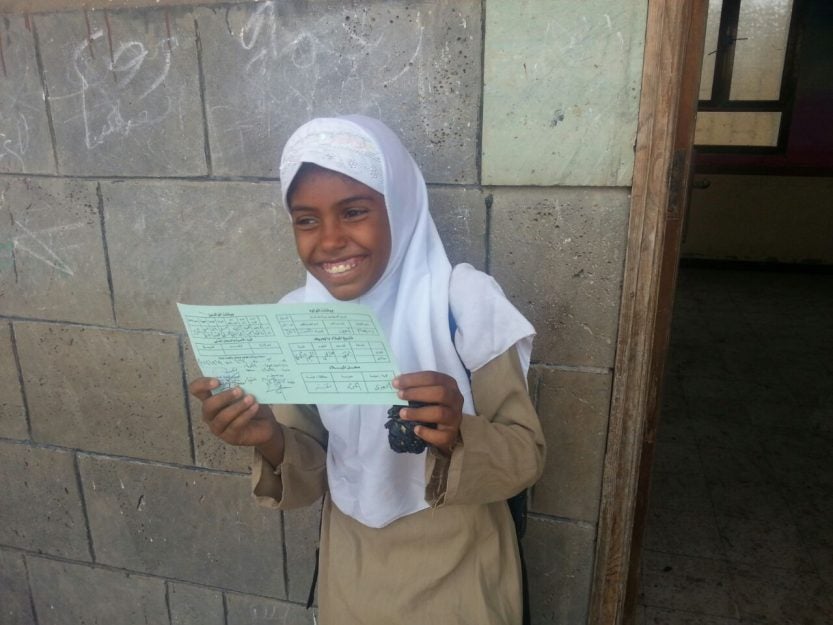by Noor Al-Kasadi
“Children without birth certificates are … at increased risk of being trafficked … or forcibly recruited into conflict.”

March 23, 2015. Every child has the right to be granted a birth certificate immediately after birth. The birth certificate recognizes that the child exists and safeguards all other rights, especially the right to protection from violence, abuse, exploitation and neglect.
Unfortunately, “Yemen has the lowest birth registration rate in the Middle East and North Africa region and indeed one of the lowest in the world. According to UNICEF, birth registration rates in Yemen have decreased from 22 percent to 17 percent since 2006. Eighty-three percent of children under 5 are without birth certificates, have no legal identity and are therefore invisible.”[1]
Birth registration is very much linked to the protection of children. Unregistered children are more vulnerable to violence, abuse, exploitation and neglect. For example, in Yemen, children can be legally married or forced to marry at any age. According to a UNICEF baseline survey (2014), one in five women between ages 15 and 49 was married by the time she was 15 years old (19 percent).
Unregistered children are also treated more harshly by the criminal justice system. A child 15 and older who commits a crime is incarcerated with adult prisoners in the central prison of the respective governorate. The child thus faces a heightened risk of sexual assault. In contrast, a child below the age of 15 benefits from a relatively child friendly justice system that places him or her in a care center instead of a prison and provides educational and rehabilitation programs. However, if that same child remains in custody after age 15, he or she will be moved to the central prisons, a policy that risks undermining all the investments made in that child’s wellbeing under the child justice system. Moreover, a child who has committed murder could be executed if he or she does not have a birth certificate proving that they were below age 18 the offense was committed.
It is not surprising to note that there is a relationship between poverty, incarceration rates, and birth registration. Children who find themselves in the penal system often come from poor families that cannot afford to pay an illegal fee in order to secure a birth certificate for their child.
Children without birth certificates are also at increased risk of being trafficked, illegally made to work (including hazardous work), or forcibly recruited into conflict. Unregistered children in Yemen have been used and recruited by the three conflicting parties since conflict erupted in 2011. These children are either being killed or maimed; and survivors are affected by psycho-social disorders. In addition, identifying and reuniting children who have been separated from their families by conflict or due to other reasons can be enormously difficult.
Article 7 of the Convention of the Rights of the Child and Article 10 of the Yemeni Child Rights Law stress that all children have the right to a legally registered name, officially recognized by the government. In addition, the periodic reports of the Concluding Observations of the International Committee on Yemen have strongly urged that Yemen ensures registration of all births, raise awareness, establish mechanisms for registration in hospitals and at home, and tackle corruption by making sure parents are not charged an illegal registration fee.
The Government of Yemen can increase the birth registration rate fairly easily, even if lacking financial resources. First, the government should make registration compulsory as per the national legislation. The government should also coordinate efforts with relevant sectors, in particular the health sector, especially during vaccination campaigns, and by activating the birth notification system.
Involving the education sector is also important, as school registration provides a good opportunity for a child to be formally included in birth registration records. Moreover, the Government of Yemen should benefit from the support provided by UNICEF and the European Commission allocated mainly for capacity building, communication for change, legal reform, and electronic systems to avoid duplication.
[1] UNICEF Yemen Country Office. UNICEF Yemen Situation Report. http://www.unicef.org/mena/UNICEF_Yemen_SitRep_October_2014.pdf. October 2014.
 Noor Al-Kasadi is a UNICEF senior child protection officer based in Yemen and a Spring 2015 G. Barrie Landry fellow at the FXB Center for Health & Human Rights.
Noor Al-Kasadi is a UNICEF senior child protection officer based in Yemen and a Spring 2015 G. Barrie Landry fellow at the FXB Center for Health & Human Rights.

